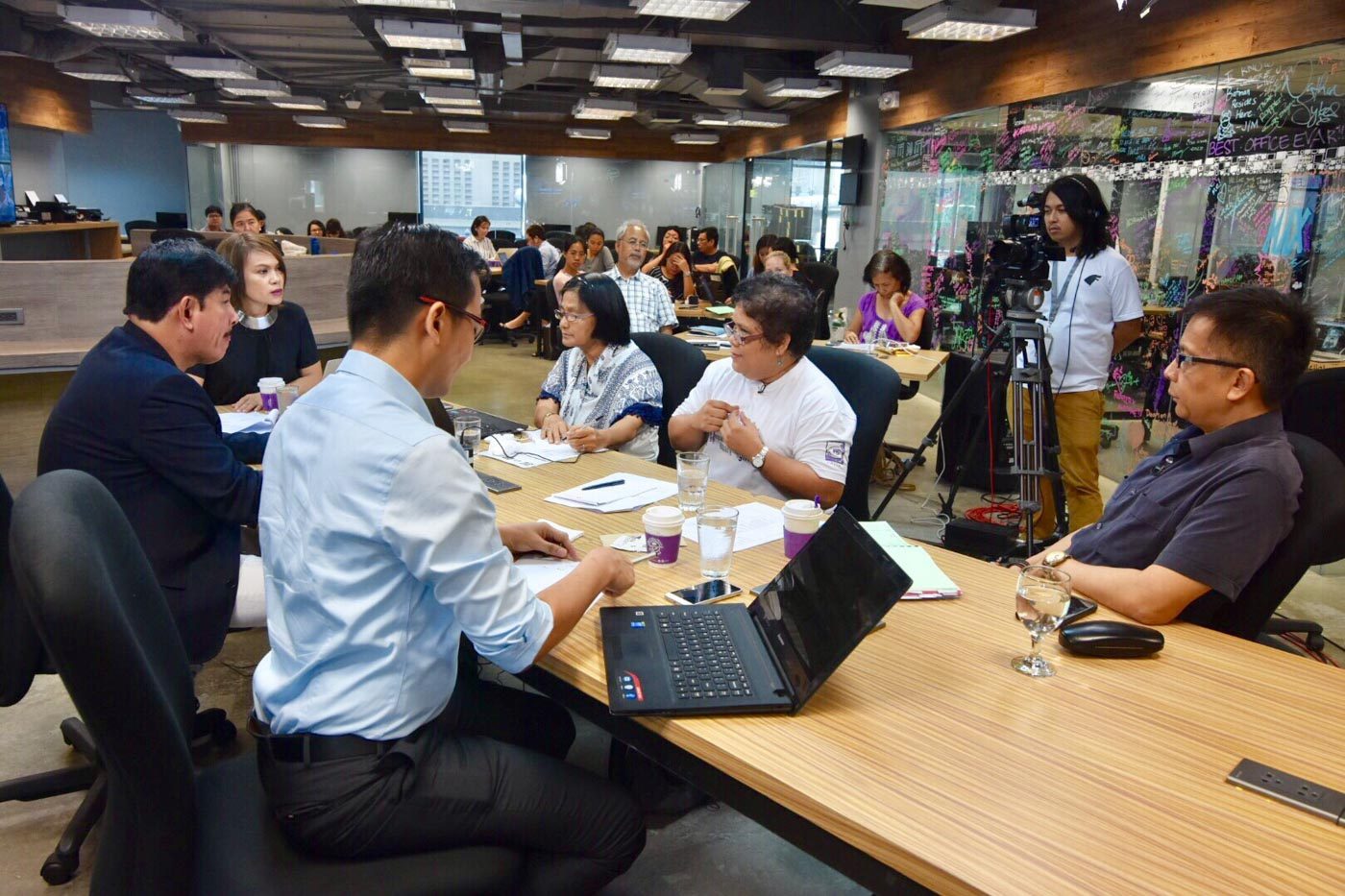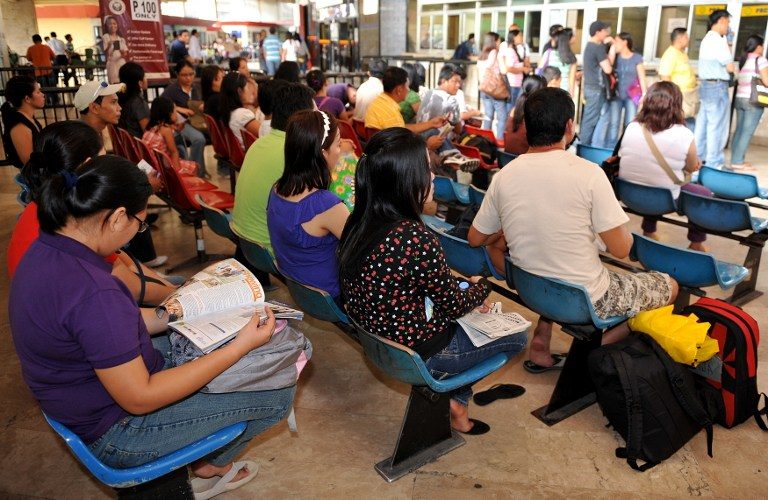SUMMARY
This is AI generated summarization, which may have errors. For context, always refer to the full article.

MANILA, Philippines – What can we do to ensure the protection of overseas Filipino workers (OFWs) in their host countries?
This is one of the questions raised during the roundtable discussion on President Rodrigo Duterte’s migration policy on Friday, September 1, organized by Rappler, the Center for Migrant Advocacy, and the Working Group on Migration from the Department of Political Science at the Ateneo de Manila University.
Hosted by journalist Ana Santos, the panel discussion tackled issues affecting OFWs including streamlining government offices, expanding OFW benefits, and onsite protection.
The panelists include Philippines Overseas Employment Agency Director Levinson Alcantara, Overseas Workers Welfare Administration Administrator Hans Cacdac, CMA Executive Director Ellene Sana, Unlad Kabayan Executive Director Maria Angela Villalba, and Department of Foreign Affairs (DFA) Executive Director for Migrant Workers Affairs Raul Dado.
As of 2015, an estimated 6,092 Filipinos leave the country daily to seek greener pastures. (READ: What you need to know about overseas Filipino workers)
Meanwhile, the Commission on Filipinos Overseas said there is a stock estimate of 10 million OFWs as of 2013.
Sexual abuse, harassment
Studies and anecdotal reports have shown that many Filipinos working abroad are exposed to violence, exploitation, and sexual harassment of their employers; and even incarceration. (READ: Getting to know the OFWs)
Dado confirmed this during the panel discussion. “I was in Kuwait for 4 years as consul general and we are facing problems like rape and sexual abuse [of our OFWs] every day,” he said.
Part of the problem, Villalba said, is rooted in the mismatch of the OFW population with the number of Philippine embassies and consulates around the world.
According to CMA, there are only 80 Philippine diplomatic posts in 60 different countries that serve millions of OFWs.
In Saudi Arabia alone, for example, the two Philippine offices in Jeddah and Riyadh are expected to cater to the needs of thousands of OFWs in the Middle East country. According to the POEA, in 2015, at least 406,089 OFWs were deployed to Saudi Arabia, the top OFW destination in the last 5 years.
“We have so many OFWs…and yet our capacity to respond to their needs is so limited,” Villalba said. She added that this mismatch in numbers leaves embassies and consulates “cash-strapped.”
Government efforts
To help address this problem, Dado said that the Duterte administration is proposing a P1-billion supplemental budget for the DFA in 2018. Part of this will fund the deployment of mobile teams, lawyers, rescuers, and vehicles to reach OFWs in far-flung areas.
“So in Kuwait, for example, what we did is to have teams on the ground checking on employers, on houses, on all these women who are being abused and to rescue them using our diplomatic immunity as consuls to get them out from that situation where we have these problems and get lawyers to file cases,” Dado added.

OWWA chief Cacdac bared plans to increase the presence of OWWA to 500 representatives across the globe, from the current 106, in the next few years. Of this planned number, 300 representatives will be allotted to the Middle East.
Cacdac also cited Labor Secretary Silvestre Bello III when he said: “Tingnan ‘nyo ‘yung pangalan ng OWWA. Ano ‘yung unang letra? Overseas. Therefore, dapat damihan natin ang tao sa overseas. Ganoon lang kasimple because that is our objective.”
(Look at OWWA. What does the first letter stand for? Overseas. Therefore, we have to increase the number of our people abroad. That’s how simple our objective is.)
Turning this plan into reality is not simple. There are at least two pre-conditions that must be met. First, the budget department must approve the proposed fund for the 500 positions. Second, the host government must approve the proposal to bring in more people.
“This day, the problem of lack of personnel is being addressed through the sending of augmentation teams, of rapid response teams,” Cacdac added.
Leverage demand
These government efforts and plans would not be enough to fully ensure the protection of Filipino migrant workers. The panelists agreed that the host countries of OFWs should also do their part.
Why not leverage the demand for Filipino migrant workers when going into multilateral or bilateral negotiations with host countries? Sana raised this during the panel discussion. After all, she said, the Philippines is not the only economy benefitting from the deployment of OFWs around the world.
“When we conclude arrangements with our countries of destination, they should realize that they are equally responsible for them. Kung wala ang migrant workers, matutuloy ba yung mga constructions nila diyan sa Middle East (If there are no migrant workers, can they continue the construction in the Middle East)? These workers guarantee that the work goes uninterrupted,” Sana added.
Dado echoed this. “We need to have leverage and enough courage to go to the host government and demand for the rights of our migrant workers. This is under the assumption that if they don’t treat our workers well, we can move them back to the Philippines and leave their economy to suffer,” he said.
According to the Bangko Sentral ng Pilipinas (BSP), OFW remittances in 2016 reached a record $26.9 billion, a 5% increase from $25.61 billion in 2015.
The BSP added that bulk of the OFW remittances came from Japan, Qatar, and the United States, and peaked during the Christmas season.
Promises
When he ran for the highest position in the land last year, President Rodrigo Duterte promised to make working abroad only an option, and not a necessity, for Filipinos.
He promised to make this happen by getting rid of corruption in the country to make way for better job opportunities in the Philippines. (READ: How Duterte cared for OFWs in first 100 days)
Overall, the panelists agreed that a lot needs to be done to make this promise a reality, and much more to fully ensure the protection of Filipino workers abroad.
“Under our Constitution we are duty-bound to protect. Right now, it’s clear that we need more people on the ground. We need more people who can speak the langauge, the dialect, and know Filipino culture and bridge the gap between what needs to be done to protect our workers and fill in the shortcomings of the host countries,” Cacdac said. – Rappler.com
Add a comment
How does this make you feel?
There are no comments yet. Add your comment to start the conversation.